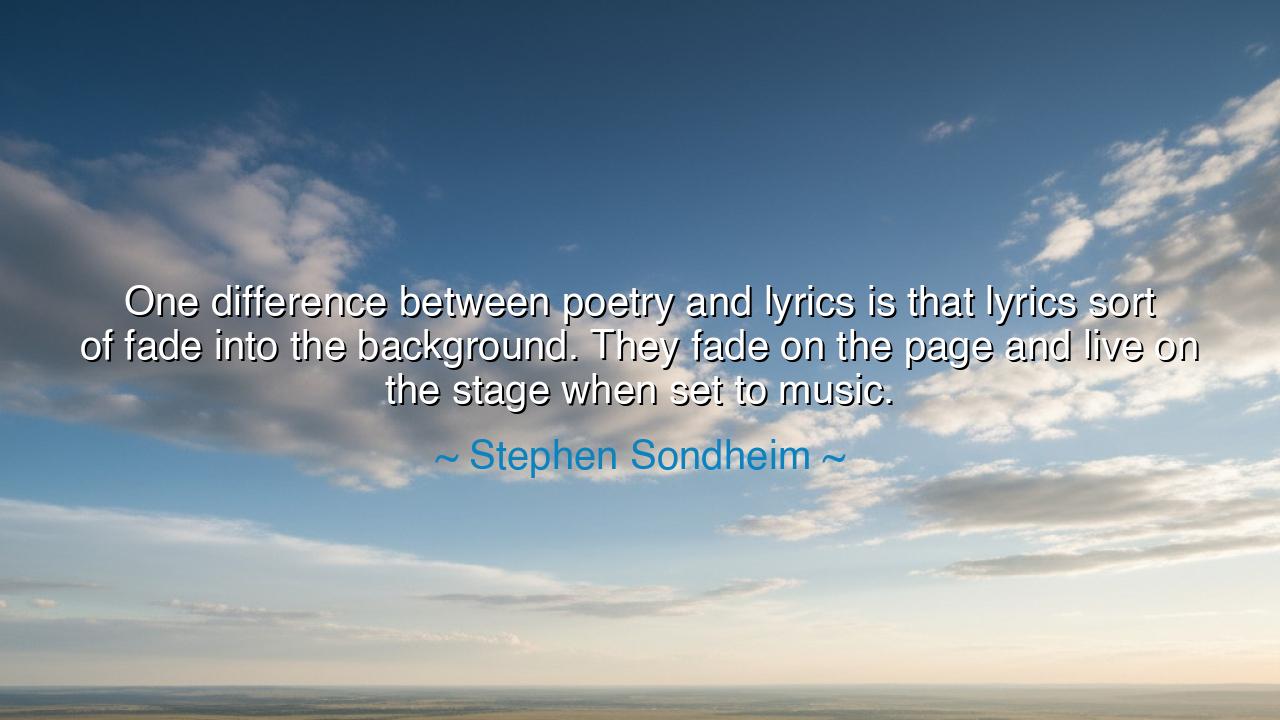
One difference between poetry and lyrics is that lyrics sort of
One difference between poetry and lyrics is that lyrics sort of fade into the background. They fade on the page and live on the stage when set to music.






Hear the words of Stephen Sondheim, master of the modern stage, who declared: “One difference between poetry and lyrics is that lyrics sort of fade into the background. They fade on the page and live on the stage when set to music.” In this reflection lies a profound truth: that while poetry stands alone as an edifice of words, lyrics are born for union, meant to intertwine with melody, movement, and performance. They are not solitary monuments, but living spirits that awaken fully only when wedded to sound.
For poetry is the still flame on parchment, a form that calls the reader to pause, to weigh, to taste each word in silence. Its power rests in the permanence of text, in the careful arrangement of syllables that echo in the reader’s mind long after the voice has ceased. But lyrics, Sondheim teaches, are different: they are not content merely to dwell on the page. They are seeds awaiting music, breath, and stagecraft. Without this union, they may appear pale and incomplete, like wings without air. But when joined with song, they soar, they ignite, they become something greater than themselves.
Consider the story of the ancient Greek tragedians. Aeschylus, Sophocles, and Euripides did not merely write poetry to be read in solitude; their words were set to choruses, chants, and dances performed beneath the open sky. The text alone preserved their ideas, but the power of their art was only truly revealed in the theater, where words, rhythm, and music fused into one sacred experience. Just as Sondheim observed, their lyrics lived not on the page, but on the stage, burning in the hearts of those who gathered to witness.
So too in later centuries, opera gave us an eternal lesson. A libretto without music often seems frail, like a skeleton stripped of flesh. But when wedded to the score, the same words move nations, stir tears, and summon courage. Think of Mozart’s Don Giovanni or Verdi’s Aida. Their libretti, read silently, might seem plain. Yet when the orchestra rises, the voices thunder, and the stage comes alive, the words achieve immortality. Thus do we understand Sondheim’s wisdom: lyrics are vessels meant to be filled with melody.
The lesson here is not only for artists, but for all seekers. It is this: know the nature of your work, and let it live where it belongs. Do not demand from a lyric what belongs to poetry, nor from poetry what belongs to lyric. Likewise in life, do not force one gift into the mold of another. Some things are meant for the quiet page; others are meant for the living stage. To honor the purpose of each is to unlock its fullest power.
Practically, let us act with discernment. If you are a writer of words, ask yourself: are these meant to be read in stillness, or sung in motion? If you are a creator, ask: where will my work live—in the mind, in the heart, in the ear, or in the eye? And in your daily life, do not shrink from allowing your own voice to find the right setting, the right harmony, where it may flourish fully. For authenticity is found not in forcing, but in placing each thing in its true home.
Thus, Stephen Sondheim’s words endure as a teaching: “Lyrics fade on the page and live on the stage when set to music.” May we remember this, O children of tomorrow: that every creation, like every soul, has a proper place where it is meant to shine. Let us honor that place, and in so doing, allow both our words and our lives to become living songs that echo across the ages.






AAdministratorAdministrator
Welcome, honored guests. Please leave a comment, we will respond soon